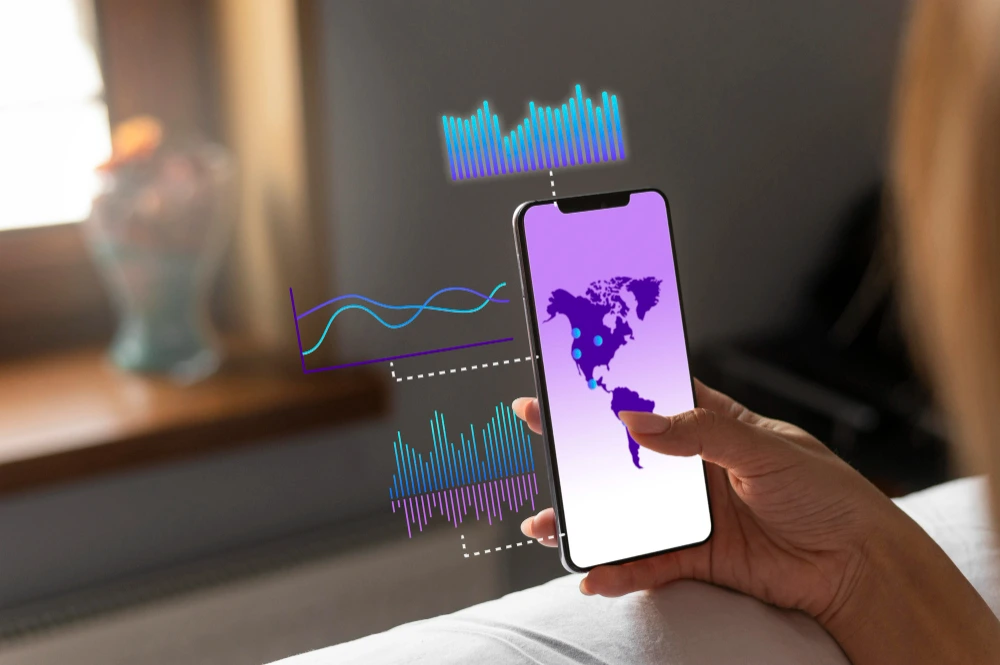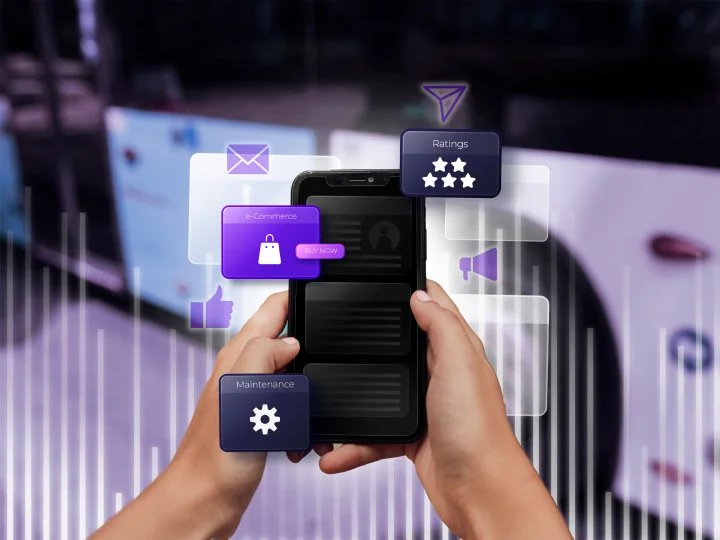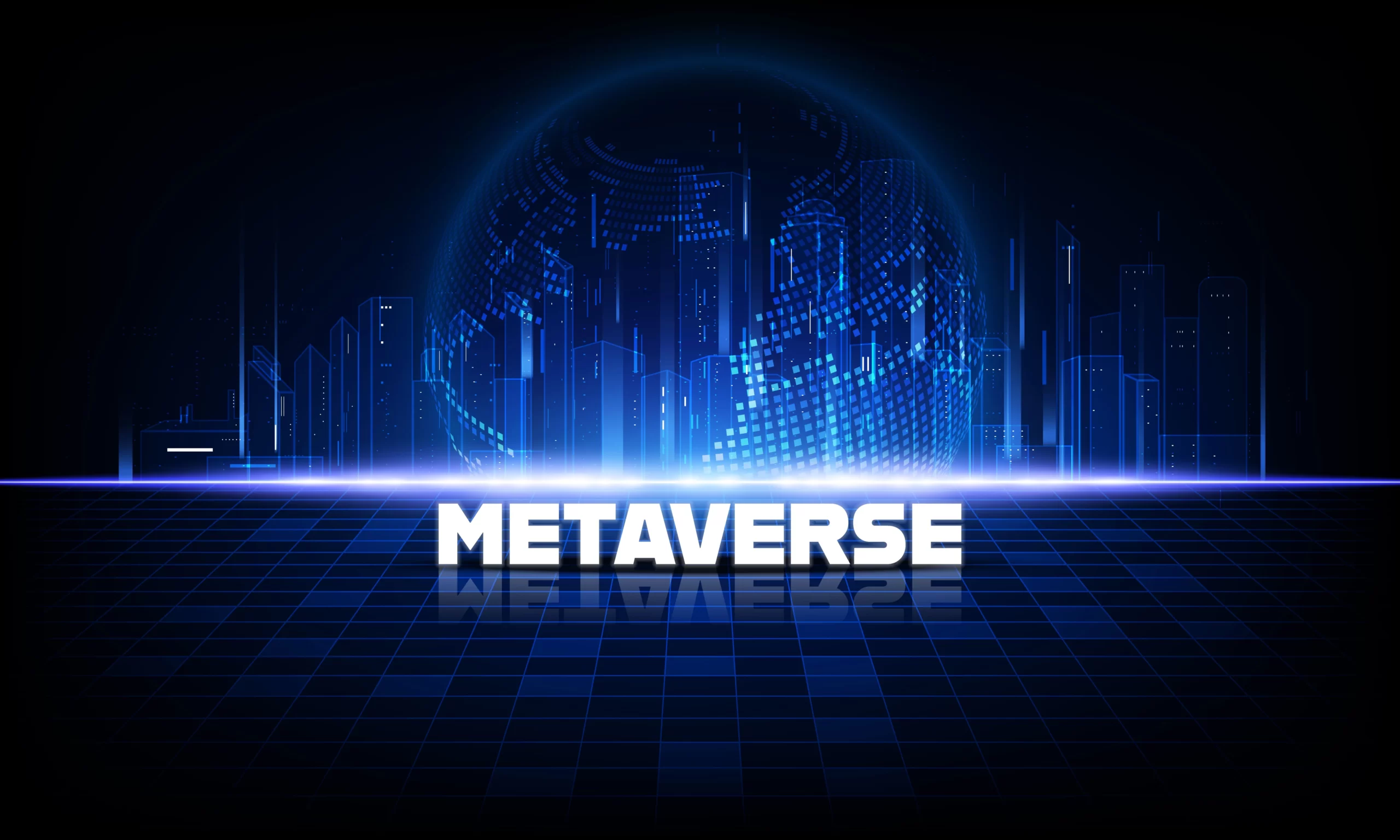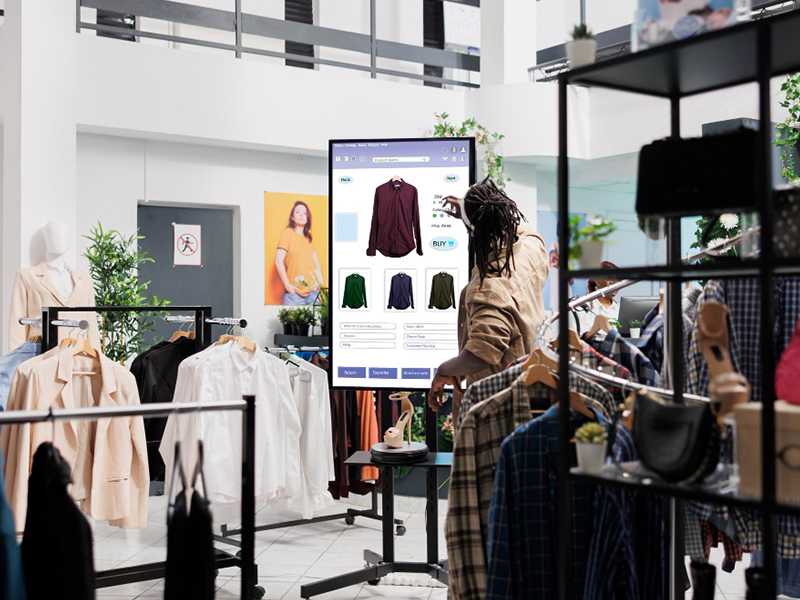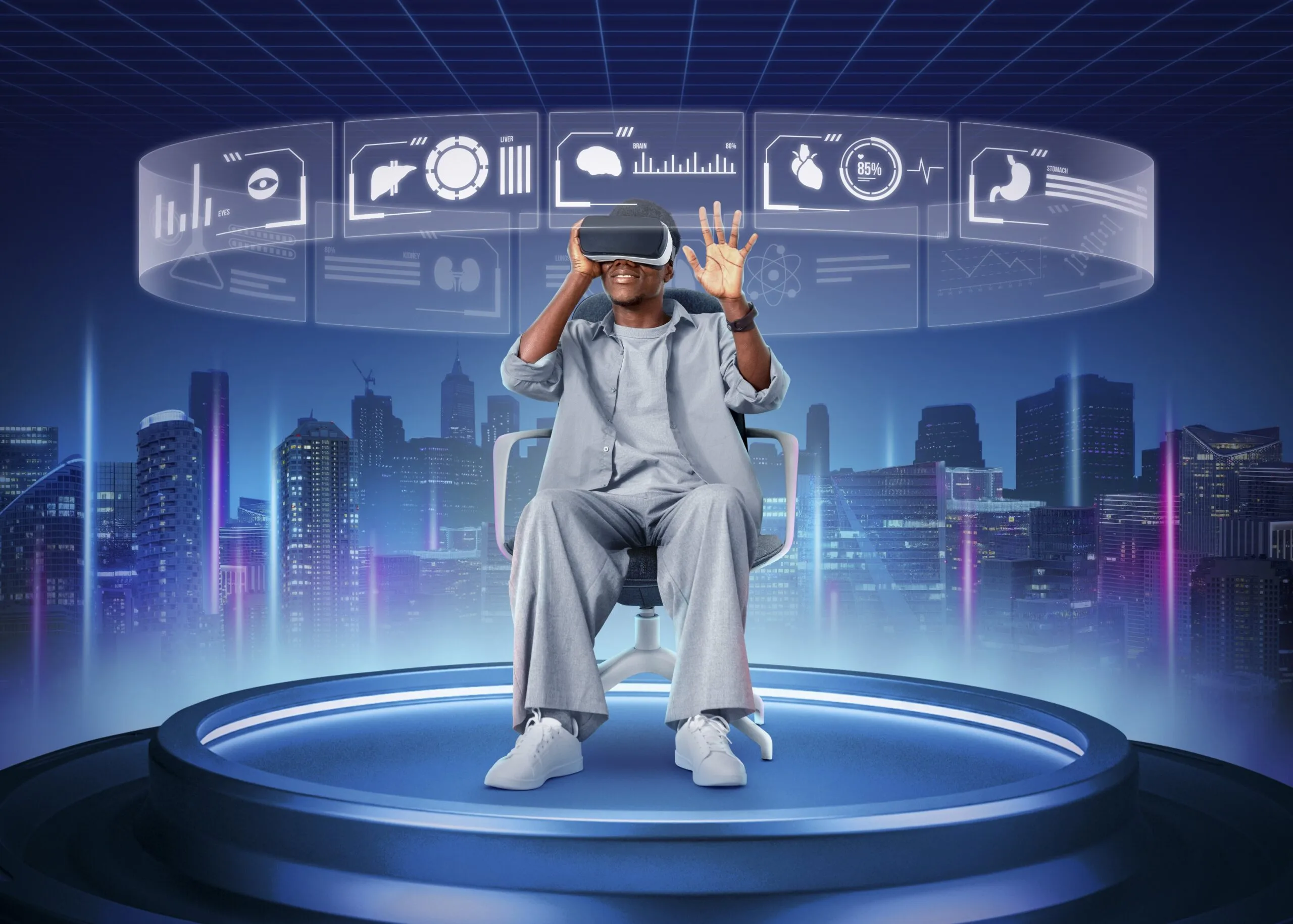
If you still regard the Metaverse as a distant vision, it’s time to catch up. In this article, we, a Metaverse development agency, invite you to explore the profound impact of the Metaverse on various business sectors.
Beyond gaming, the Metaverse is a trending technology reshaping diverse industries. Companies are already harnessing its potential to engage customers and enhance brand performance. The rapid development of immersive, 3D online worlds promises transformative effects in education, healthcare, retail, manufacturing, and more.
Imagine a future where virtual reality enhances classroom learning, telehealth visits become immersive experiences, and shopping transcends physical stores. The Metaverse is not just a buzzword; it’s a tangible force reshaping the business landscape. In this article, we delve into seven business sectors that have already been transformed by the Metaverse, shedding light on the opportunities and innovations that await those who embrace this paradigm shift. Join us as we navigate this exciting journey of technological evolution together.
How Has The Metaverse Transformed These 7 Business Sectors?
Retail
The Metaverse is revolutionizing the retail sector, ushering in transformative changes:
Immersive Shopping Experiences
Retailers are crafting virtual storefronts and interactive showrooms, offering customers a lifelike and engaging product exploration. For instance, Nike’s “Nikeland” store on Roblox lets users play games, try on clothes, and compete.
Personalized Recommendations
Leveraging customer data, retailers provide tailored product suggestions within the Metaverse. Sephora’s virtual makeup store allows users to experiment with products using augmented reality.
Stronger Customer Relationships
Real-time interactions in the Metaverse enable retailers to address queries, offer product details, and resolve issues, fostering customer loyalty. Gucci’s “Gucci Garden” on Roblox immerses users in the brand’s culture and history.
Expanding Customer Reach
Virtual stores enable retailers to connect with customers who can’t visit physical locations. Balenciaga’s virtual store on Fortnite lets users buy virtual clothing and accessories.
Automotive
The automotive industry is undergoing a rapid transformation thanks to the Metaverse, revolutionizing vehicle design, development, marketing, and sales. Key impacts include
Captivating Design and Development
Virtual prototypes enable real-time collaboration among automakers, designers, and engineers, resulting in faster development, higher quality, and cost savings.
Hyundai Motor Group has collaborated with Meta (formerly Facebook) to establish a virtual showroom within the Meta Horizon Worlds platform. This innovative space enables prospective customers to immerse themselves in the Hyundai vehicle lineup and engage with the offerings within a virtual setting.
Enhanced Customer Experiences
Virtual showrooms, customizable options, and virtual test drives engage customers, boost insights, and increase sales. Ford’s Roblox virtual showroom exemplifies this.
Honda Motor Co., Ltd. has joined forces with Microsoft to harness Azure cloud services in the development of Metaverse applications. This strategic partnership encompasses the exploration of virtual showrooms, customer engagement platforms, and the creation of advanced vehicle testing environments.
Transformed Aftermarket Services
Virtual technician training and AR-based guidance enhance efficiency and safety. Toyota’s AR instructions on real vehicles demonstrate this innovation.
Emerging Sales and Marketing
The Metaverse expands avenues for personalized marketing, virtual events, and gamified experiences, reaching wider audiences.
Advanced Safety and Training
The Metaverse can be pivotal in elevating safety and driver training standards. Virtual simulations can replicate real-world driving scenarios, providing a safe environment for drivers to hone their skills even in dangerous conditions. Furthermore, virtual environments offer a testing ground to refine and enhance Advanced Driver Assistance Systems (ADAS), ultimately contributing to developing safer and more dependable vehicles.
Healthcare
The healthcare sector is undergoing a profound transformation thanks to the Metaverse, ushering in opportunities for patient care, medical training, and research. Here’s how the Metaverse is making an impact:
Enhanced Patient Care and Accessibility
The Metaverse offers immersive and personalized patient experiences, allowing remote consultations, virtual therapy sessions, and even simulated surgeries.
For example, Johnson & Johnson has introduced a virtual reality (VR) application called “Embodied Labs.” This application aids patients with conditions like Parkinson’s disease to improve their motor skills and balance through immersive experiences.
Advanced Medical Training and Education
The Metaverse offers a realistic, risk-free environment for medical professionals to train and refine their skills.
Mayo Clinic, for instance, utilizes the “Immersive Virtual Environments for Healthcare” (iVEH) VR simulation platform, enabling surgeons to practice intricate procedures in a virtual operating room.
Accelerated Medical Research and Collaboration
The Metaverse fosters global collaboration among researchers. Researchers can easily share data, analyze complex medical images, and conduct virtual experiments in a collaborative virtual environment.
An illustration of this collaboration is Pfizer’s partnership with Microsoft, leveraging Azure cloud services for Metaverse applications to expedite drug discovery and development.
Personalized Treatment Planning and Rehabilitation
The Metaverse empowers healthcare providers to craft individualized treatment plans and rehabilitation programs.
Innovative applications like Siemens Healthineers “BodyViz” VR app enable patients to visualize their internal organs and medical conditions, enhancing their comprehension of personalized treatment approaches.
Banking & Finance
The banking and finance sector is undergoing swift metamorphosis, courtesy of the Metaverse, opening up novel avenues for customer engagement, product innovation, and operational efficiency. Here are some pivotal ways the Metaverse is reshaping this industry
Engaging Virtual Branches and Personalized Experiences
Banks are establishing virtual branches within the Metaverse, offering customers the opportunity to engage with bank representatives, perform transactions, and obtain financial guidance in a captivating virtual setting.
HSBC has introduced “HSBC Metaverse” on the Sandbox platform, enabling customers to open accounts, transfer funds, and receive financial advice within a virtual world.
Enhanced Financial Education and Literacy
The Metaverse serves as a platform for banks to craft interactive and captivating financial education experiences, educating customers on topics like budgeting, saving, and investing.
Citibank has introduced the “Citi Financial Literacy” VR app, which gamifies financial education by offering users interactive challenges and simulations to enhance their understanding of personal finance.
Streamlined Customer Support and Fraud Prevention
Banks leverage the Metaverse for instantaneous customer support, addressing inquiries and resolving issues through virtual interactions and augmented reality features.
Bank of America has introduced an AR app enabling customers to scan bank statements. This provides real-time insights into spending patterns, fraud alerts, and personalized financial recommendations, enhancing fraud prevention and customer support.
Real Estate
Fractional ownership of real estate
Fractional Real Estate Ownership: The Metaverse introduces the concept of dividing real estate ownership into fractions, enabling numerous individuals to own a portion of a property. This democratizes real estate investment, providing opportunities for people to invest in real estate without purchasing an entire property.
As an illustration, Metaestate currently offers fractional ownership of virtual properties within the Metaverse.
Realogy, a prominent real estate brokerage firm, has developed a virtual reality training initiative for its agents. This program enables agents to simulate property showings and refine their skills in addressing customer inquiries within a virtual environment.
Manufacturing
Digital Twins
Manufacturers can generate virtual duplicates of their physical facilities and machinery, enabling them to simulate and enhance production workflows, detect potential issues, and trial novel technologies prior to real-world implementation.
Siemens has established a digital twin of its Amberg, Germany factory to streamline production procedures and minimize operational disruptions.
Collaborative Design and Engineering
Engineers and designers scattered across diverse locations can engage in real-time collaboration for product design through the application of virtual reality (VR) and augmented reality (AR) tools. This approach expedites the design phase and fosters the creation of more innovative products.
Boeing harnesses VR for collaborative air-plane design, resulting in reduced development durations and enhanced product excellence.
Remote Training and Maintenance
Technicians can receive training on new equipment and procedures within a secure and lifelike virtual setting. This approach diminishes downtime and enhances safety.
General Electric is employing VR to instruct its technicians in wind turbine maintenance procedures.
Supply Chain Management
Manufacturers can employ the Metaverse for real-time tracking of goods and materials, leading to enhanced efficiency and cost reduction.
DHL utilizes the Metaverse to monitor the movement of its shipments, resulting in improved customer service.
Entertainment & Media
The Entertainment and Media (E&M) sector is undergoing a metamorphosis, courtesy of the Metaverse, ushering in immersive and interactive encounters that dissolve the boundaries between the physical and digital realms. This transformation is giving rise to novel storytelling, entertainment, and social engagement forms. Here are some pivotal ways the Metaverse is influencing the E&M industry
Elevated Social Engagement and Community Forging
The Metaverse offers a platform for individuals to come together and engage within a virtual realm, giving rise to innovative modes of social interaction and community establishment.
Fortnite has emerged as a thriving virtual hub, attracting both gamers and non-gamers for socializing, event attendance, and collaborative participation in shared adventures.
Fresh Opportunities for Content Dissemination and Revenue Generation
The Metaverse introduces novel avenues for disseminating and monetizing content, encompassing virtual concerts, virtual storefronts, and in-game transactions.
In 2020, Travis Scott hosted a virtual concert within Fortnite, drawing a staggering audience of over 27 million simultaneous viewers.
The Metaverse is an entirely new world of opportunities for all business sectors. Brands across the globe are looking at innovative ways to explore this new opportunity to promote their businesses and create avenues for more sales.
As a Metaverse development company, we stand at the helm of this technological renaissance and are guiding businesses towards digital transformation.






